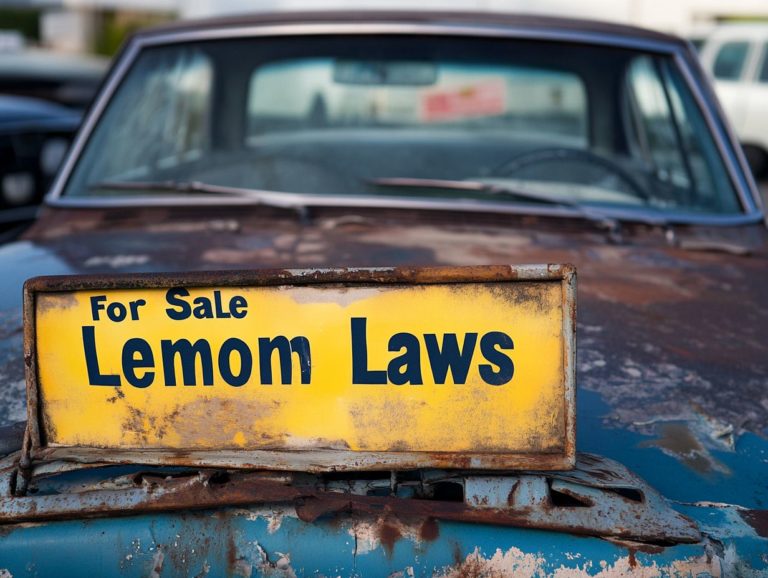Tips for Researching Used Car Prices
Get ready to unlock the secrets of used car pricing! Navigating the used car market can feel like a labyrinth, especially with many factors that influence prices. Grasping the value of used cars is crucial for making informed decisions, whether you re embarking on your first vehicle purchase or upgrading to something more refined.
This article delves into the intricacies of used car pricing, guiding you on how to uncover reliable price information both online and in your local area. It highlights what to scrutinize in price listings and shares effective negotiation strategies to empower you in the process.
Essential elements like warranties and maintenance history can significantly affect your purchase. Arm yourself with the knowledge to secure the best deal and drive away with confidence!
Contents
- Key Takeaways:
- Understanding the Value of Used Cars
- Where to Find Used Car Prices
- How to Interpret Used Car Prices
- Tips for Negotiating Used Car Prices
- Other Costs and Fees
- Warranties and Maintenance History
- Frequently Asked Questions
- What are the benefits of researching used car prices?
- Where can I find reliable information on used car prices?
- How can I determine the fair market value of a used car?
- What factors should I consider when researching used car prices?
- How can I avoid scams when researching used car prices online?
- Is it worth it to pay for a professional vehicle inspection when researching used car prices?
Key Takeaways:

- Understand the factors influencing used car prices.
- Utilize online and local resources for thorough research.
- Consider additional costs like warranties and maintenance during negotiations.
Understanding the Value of Used Cars
Grasping the value of used cars is vital for anyone looking to make informed decisions before purchasing a vehicle. Various unique factors can significantly influence the pricing of used cars, often hinging on the car’s condition, its maintenance history, and the prevailing local market trends in regions such as North Carolina and South Carolina.
Reputable resources like Kelley Blue Book and Carfax offer essential pricing information that can expertly guide you through your buying journey.
Factors that Affect Used Car Prices
Several key factors can influence used car prices, such as the vehicle’s condition, mileage, and whether it has undergone a thorough mechanical inspection. Certified pre-owned vehicles, which are cars that have been inspected and come with a warranty, typically have a higher market value, providing you with peace of mind as you make your purchase.
Mileage is another crucial determinant of a vehicle’s overall worth. Generally, higher mileage signifies more wear and tear, which can lead to a reduction in value. It’s essential for you to weigh these factors carefully, ensuring that you make an informed decision when navigating the used car market.
Where to Find Used Car Prices
Finding accurate used car prices is essential for you as a buyer, aiming to budget effectively for your next vehicle. There are numerous avenues at your disposal to gather this information, from comprehensive online inventory platforms to trusted local dealerships.
Online Resources for Research
Online resources are crucial when it comes to researching used car prices. Platforms like Kelley Blue Book, Craigslist, and Facebook Marketplace provide you with valuable information into the latest market trends. These sites empower you to compare prices, assess vehicle conditions, and evaluate seller reliability.
Kelley Blue Book offers comprehensive valuation tools and detailed vehicle histories, ensuring you understand fair pricing for your desired models. Craigslist presents a broad, localized marketplace, featuring diverse listings that accommodate various budgets. Facebook Marketplace enhances this experience by incorporating social connectivity, allowing you to interact directly with sellers, which fosters trust and engagement.
By leveraging these platforms, you equip yourself with essential information, ultimately enhancing your ability to make confident and informed purchasing decisions.
Local Resources for Research

Local resources, such as used car dealerships and trusted mechanics, are essential for grasping used car prices and automotive trade-in values in your area. By engaging with these local experts, you can gather invaluable insights into the varying conditions of vehicles on the market. They possess firsthand knowledge of local trends, including price fluctuations that often go unnoticed in online listings.
This localized expertise can significantly enhance your ability to identify reasonably priced options and steer clear of potential pitfalls. Understanding the specific needs and preferences of the local market empowers you to make informed choices, ultimately leading to wiser purchasing decisions that cater to your unique requirements.
How to Interpret Used Car Prices
Understanding used car prices is essential for making a good purchase. You need to know pricing information, current market values, and typical rates in your area.
What to Look for in Price Listings
When checking price listings, keep a few critical aspects in mind. Look at the car’s condition, the Vehicle Identification Number (VIN), and any buying incentives.
Inspect the vehicle closely. This can reveal potential issues that might not be obvious at first glance.
Use the VIN to access the car s history report, which shows past accidents or maintenance records.
Financial incentives like manufacturer rebates or dealer promotions can significantly affect the price. Don’t ignore these offers, as they can make a big difference in your decision.
By focusing on these key components, you can make a smart investment in your next vehicle.
Tips for Negotiating Used Car Prices
To negotiate effectively, you need reliable pricing knowledge and a clear understanding of financing options. Be aware of automotive trade-in values as well.
Strategies for Getting a Better Deal
Use effective strategies to unlock better deals when negotiating. This will help you take advantage of special offers at local dealerships.
Understanding current market values is key. This knowledge helps you judge if a promotion is truly beneficial.
Explore various financing options to influence your monthly payments and overall costs. Familiarize yourself with interest rates and loan terms.
Rely on trusted resources like consumer reports to strengthen your negotiation tactics. This will lead to a more satisfying purchasing experience.
Other Costs and Fees

When buying a used car, assess various costs. Look at warranties, maintenance history, and the benefits of extended warranties.
Understanding the costs and fees associated with purchasing a used car is crucial. These can dramatically affect your total expenditure.
These costs often include taxes, registration, and dealership fees, which can add hundreds or thousands to the initial price.
As you evaluate the market value, factor in these expenses to avoid unexpected financial burdens. Taxes vary based on local rules and purchase price.
Researching and budgeting thoroughly will ensure a transparent purchasing experience.
Start your car search today and apply these tips to get the best deal!
Warranties and Maintenance History
When considering a used car, warranties and a thorough maintenance history are essential. These elements offer valuable insight into the vehicle s reliability and potential future costs.
Understanding these factors is key to making informed decisions. A warranty serves as a safety net. It ensures you won t be caught off guard by unexpected repair bills after you drive off the lot.
A well-documented maintenance history can make certified pre-owned vehicles more attractive. It showcases regular servicing and care, indicating a lower risk for you as a buyer. With these assurances in place, you re bound to feel more confident about your purchase.
This leads to reliable pricing and reduces the chance of unpleasant surprises later.
Frequently Asked Questions
What are the benefits of researching used car prices?
Researching used car prices helps you understand the market better. It allows you to make informed decisions when purchasing a used car. For a deeper insight, check out our complete guide on understanding used car pricing, which can also help you negotiate a better price and avoid overpaying for a vehicle.
Where can I find reliable information on used car prices?

There are several sources for reliable information on used car prices, such as online car pricing guides, dealership websites, and classified ads. You can also consult with friends and family who have recently purchased a used car.
How can I determine the fair market value of a used car?
The fair market value of a used car can be determined by researching similar vehicles in your area and comparing their prices. You can also use online valuation tools or consult with a professional appraiser for a more accurate estimate.
What factors should I consider when researching used car prices?
When researching used car prices, look out for these important factors:
- Car’s age
- Mileage
- Condition
- Location
- Make and model
- Features and options
- Current market demand for that vehicle
How can I avoid scams when researching used car prices online?
To avoid scams when researching used car prices online, be cautious of suspiciously low prices. Avoid requests for personal information and sellers who refuse to meet in person for a test drive. Always research the seller and the vehicle’s history before making a purchase.
Is it worth it to pay for a professional vehicle inspection when researching used car prices?
Yes, it is worth paying for a professional vehicle inspection when researching used car prices. A trained mechanic can identify any hidden issues with the car that could affect its value. This can help you negotiate a fair price and provide peace of mind knowing that the car is in good condition before making a purchase.






